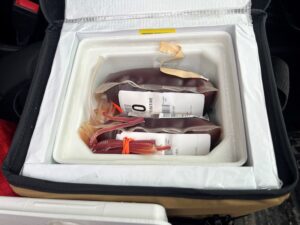Who is a member?
Our members are the local governments of Massachusetts and their elected and appointed leadership.

The Canton Fire Department stores blood in a temperature-controlled container for transfusions in the field. (Photo courtesy Leo Reardon/Canton Fire Department)
Mass Innovations, From The Beacon, October 2024
Motivated by the memory of a teenage boy they couldn’t save, and aided by a well-timed college football game, the Canton Fire Department has developed a first-in-the state ambulance blood transfusion program, which has already saved several lives in recent months.
In March, the fire department became the first agency in the state to offer universal whole-blood transfusions to patients before they reach the hospital. Partnering with Boston Medical Center, the department can supply transfusions to roughly two dozen south-of-Boston communities within a 30-minute drive of Canton, and as of last month had already given 10 transfusions in the field, to patients who otherwise wouldn’t have survived the ride to the hospital, officials said.
Canton’s efforts date back almost a decade, when Leo Reardon, the department’s emergency medical services coordinator, and Dr. Mike Valkanas, the department’s medical director, responded to a 16-year-old boy who had been run over by his own vehicle. They tried to save him, but he bled to death before he could get to a hospital.
“We kind of, at that point, found ourselves frustrated by the fact that we can do so many other things at the paramedic level, in the prehospital space, for the treatment of patients with chest pain, and heart attacks, and strokes, and things like that,” Reardon said. “We have so many tools at our disposal to be able to bring to the patient’s bedside. And you know, when it comes to trauma, we’re not really doing anything at all different than what we were doing, like, way back in the 1970s. So we found ourselves really looking for answers on how we could do something different.”
Canton officials say the prehospital transfusions at the scene of an accident, or in an ambulance en route to the hospital, can buy patients just enough time to receive level one trauma care in a Boston emergency room. The transfusions given by paramedics can take just two to five minutes, Reardon said. Eight of the program’s first 10 transfusions were administered due to motor vehicle accidents, he said, and given Canton’s proximity to several major roads and highways, the service “kind of became a no-brainer.”
The use of whole blood in the field is a newer concept, having emerged from military battlefield medicine. Blood transfusions in hospitals typically have been administered as a succession of separate blood components — not all components, all at once. Proponents say whole-blood transfusions have shown success in saving the lives of severe trauma patients. In their partnership with Boston Medical Center, Canton paramedics administer low-titer, O-positive whole blood, a universal version intended to minimize bad immunity reactions in people with different blood types.
Canton’s program got its start in San Antonio, where the city launched the country’s first whole blood EMS program, and where Reardon received training. But to proceed, the town needed a more local partner, and teamed up with BMC, and more specifically, with Dr. Crisanto Torres, who has researched the practice. The transfusion team included Dr. Daniel Muse, another EMS medical director who oversees many of the communities now included in the program. With those pieces in place, Reardon and the team sought approval from the state, from the town, and from the unions to add the service. It so happened that college sports intervened.
On Dec. 9 last year, Gillette Stadium in nearby Foxborough hosted the iconic Army-Navy football game. Organizers wanted to have onsite transfusion capacity available, Reardon said, and Canton’s application to the state to administer field transfusions was already pending. The state’s approval came on Dec. 1, and eight days later, the team arrived with six units of blood. They didn’t need the blood that day, but it got the ball rolling for opening the program officially a few months later.
Seventeen out of the fire department’s 54 employees, enough to ensure transfusion coverage on every shift, trained with Boston University Medical School trauma surgeons and personnel at BMC, and they receive ongoing training.
The department built a satellite blood bank to store and refrigerate the blood, Reardon said. Paramedics responding to a transfusion call carry the blood in a transport cooler, and then use equipment to warm it up before it goes into the arms of patients. The department bought a special field transfusion truck, but paramedics can take the blood onto other vehicles.
Reardon said Canton received $175,000 of the state’s share of American Rescue Plan Act funds, with the help of Rep. Bill Galvin and Sen. Walter Timilty, to pay for the truck. Town officials said the department also received about $35,000 in federal Homeland Security funds to purchase equipment for storing and transporting the blood.
“I think the program has proved its worth with 10 field transfusions completed and multiple lives saved,” said Town Administrator Charles Doody, who was involved in the program’s early planning when he was the fire chief. “[Ongoing] funding will be the next hurdle.”
Canton’s one-year program approval from the state is due to expire on Dec. 1, and the department is reapplying through the Department of Public Health, Reardon said. It has already been working with Mansfield to start a service there, he said, and “our goal is to make services like this available to more people in the state.”
For more information about Canton’s transfusion program, contact Deputy Fire Chief Scott Johnson at [email protected].